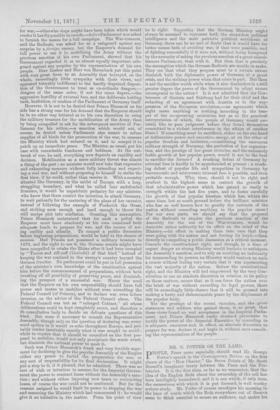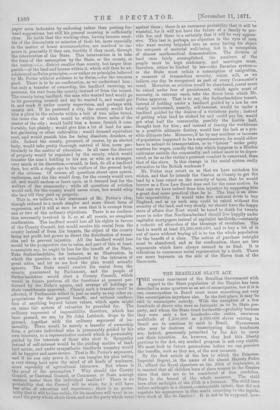MR. G. POTTER ON THE LAND.
PEOPLE, Peers more especially, should read Mr. George Potter's speech in the Contemporary Review on the first clause of the " New Charter," the Seven Points of Mr. Scott Russell's imaginary treaty between the Peers and the Pro- letariat. It is the first time, as far as we remember, that the idea of the English Reds about the ownership of the soil has been intelligibly formulated, and it is one which, if only from the earnestness with which it is put forward, is well worthy serious study. Mr. Potter of course envelopes his meaning in the haze of words which the Reds everywhere out of Geneva seem to think essential to secure an audience, and makes his paper seem indecisive by endorsing rather than putting for- ward suggestions, but still his general meaning is sufficiently clear. He holds that the working-class, having become sensi- ble of the discomforts or miseries of their lot, more especially in the matter of house accommodation, are resolved to im- prove it, peaceably if they can, forcibly if they must, through the intervention of the State. This intervention is to take the form of the assumption by the State, or the county, or the canton—i.e., district smaller than county, but larger than parish—of the land and houses within it, which will then be ad- ministered on Swiss principles,—or rather on principles believed by Mr. Potter without evidence to be Swiss,—for the common good. There is to be no confiscation, as we understand him ; but only a transfer of ownership, the landlord receiving, we presume, his rent from the county, instead of from the tenant. The county being landlord, the man who wanted land would go to its governing council and say he wanted it, and would get it, and work it under county supervision, and perhaps with county aid. If he preferred a city, the county would find him a place in the suburbs within a belt of two miles broad, the inner rim of which would be within three miles of the centre of the city ; would build him a house, furnish it com- fortably, but plainly ; would give him a bit of land for mar- /het gardening or other cultivation ; would demand equivalent rent, and would punish him for being dissolute, drunken, or idle. Indeed the county, governed, of course, by an elected body, would take pretty thorough control of him, more par- ticularly in the matter •of education. In all cases the descent of property would be regulated by the county, which would transfer the man's holding to his son, or wife, or a stranger, very much at its discretion,—would, in fact, do all a landlord does, but with a single eye to the welfare of the general body of the citizens. Of course, all questions about open spaces, enclosures, and the like would drop, for the county would own all, and would enclose or leave open, as it deemed best for the welfare of the community ; while all questions of eviction would end, for the county would never evict, but would whip the lazy till they paid up properly.
This is, we believe, a fair statement of Mr. Potter's idea, though reduced to a much simpler and more direct form of expression, and it will at once be seen that it is exempt from one or two of the ordinary objections. There is no confisca- tion necessarily involved in it, or, at all events, no complete confiscation. The landlord would lose all his rights in favour of the County Council, but would receive his rental from the county instead of from his tenants, the object of the county being not profit, but power to direct the distribution of tenan- cies and to prevent injustice. All the landlord would lose would be the prospective rise in value, and part of this at least, economists say, he ought to lose for the benefit of the State. 'Take Sutherlandshire, for instance, as an illustration, in which the question is not complicated by the intrusion of great cities, and let us see how the plan would actually operate. The Duke would receive his rental from the county, guaranteed by Parliament, and the people of Sutherlandshire would elect a County Council, which would in future perform all the functions at present per- formed by the Duke's agents, and arrange all holdings as their constituents approved. Clearly such a transfer could be effected, if Parliament willed it, just as easily as any other ex- propriations for the general benefit, and without confisca- tion of anything beyond future values, which again might on some fair system of valuation be provided for. The ordinary argument of impossibility, therefore, which has been pressed, we see, by Sir John Lubbock, drops to the ground, together with the ordinary argument of im- morality. There would be merely a transfer of ownership from a private individual who is presumably guided by his own interests, to a representative council which is presumably guided by the interests of those who elect it. Sympathy instead of self-interest would be the guiding motive of land- lord action, and under sympathetic landlords tenantry would all be happier and more secure. That is Mr. Potter's argument, and if he can only prove it, we can imagine his plan taking ,a very strong hold upon the mind of all kinds of workmen, more especially of agricultural labourers. But where is the proof of the assumption I Why should the County 'Council, or Cantonal Council, or Commune, or State manage matters better than the individual landlord ? There is no probability that the Council will be wiser, for it will have less alike of education and experience ; there is no proba- bility that it will be less unfair, for its members will want to re- ward the party which elects them, and not the party which votes against them ; there is an enormous probability that it will be wasteful, for it will not have the future of a family to pro- vide for, and there is a certainty that it will be very oppres- sive. This last is, perhaps, no objection in the eyes of men who want society brigaded into an army having for object the conquest of material well-being, but it is susceptible of almost mathematical demonstration. The division of land once fairly accomplished, the numbers of the people must be kept stationary, and marriages must, therefore, either be limited by law—the Bavarian system— or the State must ordain a conscription of emigration, a measure of tremendous severity, which will, as we believe, one day be recognized as part of every Communist's creed. Moreover, as eviction would be abandoned, rental must be raised under fear of punishment, which again must of necessity, in extreme cases, take the direct form which Mr. Potter approves. That is to say, the Sutherlandshire tenant, instead of holding under a landlord guided by a law he can clearly understand, namely, self-interest, would be under a landlord guided by the desires of a victorious party ; instead of getting what land he wished for and could pay for, would get what half the community, possibly the hostile half, thought best for him ; and instead of fearing the workhouse as a possible ultimate destiny, would fear the lash as a pos- sible ultimate fate. Moreover, if he by any accident or increase of population happened to be a supernumerary, he would either have to submit to transportation, or to " labour " under petty masters for wages, exactly the fate which happens to a Hindoo cultivator outside the community, and rather more to be depre- cated, as far as the victim's personal comfort is concerned, than that of the slave. Is this change in the social system really attractive to the British workman ?
Mr. Potter may retort on us that we have mistaken his wishes, and that he intends the Canton or County to get the land by a loan raised on the security of taxes, that he would borrow as a Poor Law Board does and for the same motive. In that case we have indeed done him injustice by supposing him a great deal more practical than he is. The loan is an abso- lute impossibility. It would take five national debts to buy England, and as no such sum could be raised without the security of the land, and very slowly, we should have the happy state of affairs that Kent would be taxed to death for twenty years in order that Northumberland should live happily under capitalist mortgagors instead of capitalist landlords,—certainly a reductio ad absurdum of the blessings of revolution. The land is worth at least £3,300,000,000, and to buy a bit of it out of taxes without buying all is to tax the whole population for the benefit of a class. The notion of purchase outright must be abandoned, and as for confiscation, there are two arguments which have always seemed to us final. It is ridiculous to commence social regeneration by a theft. There are more bayonets on the aide of the Haves than of the Have-no ts.



































 Previous page
Previous page